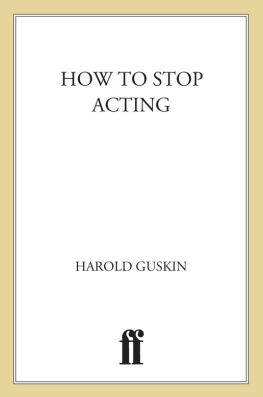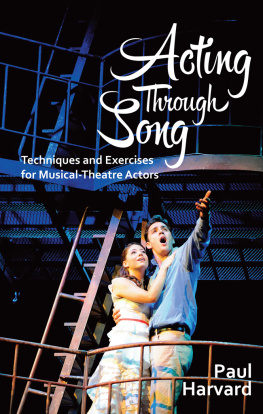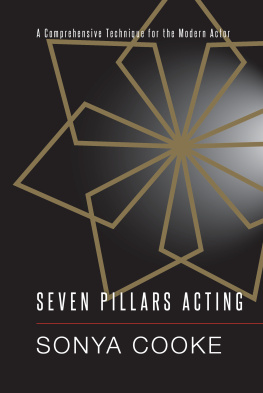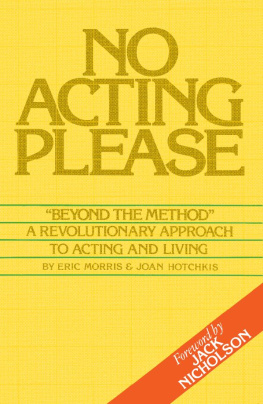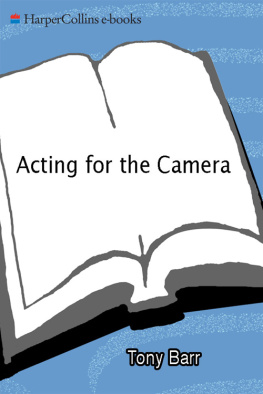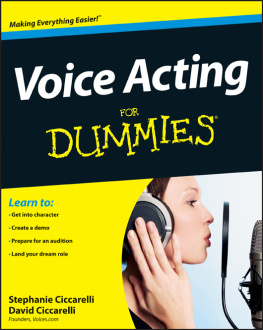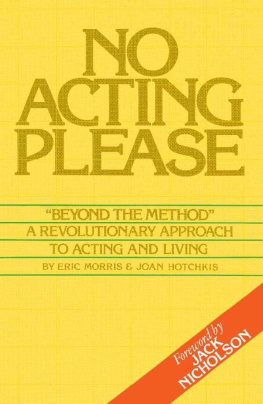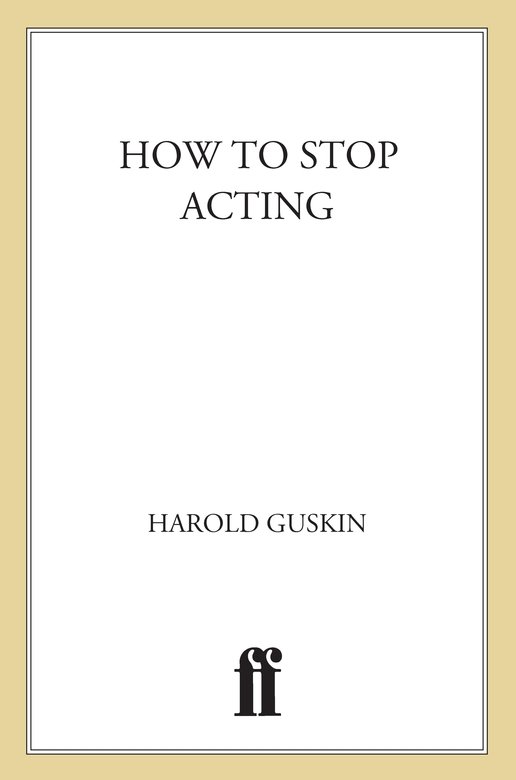This book would not have been possible without the help of David Finkle. He encouraged me to write it in my own words so that the reader could hear me directly. He helped me to trust my writing, which was very difficult for me. I thank him for his generosity in sharing himself, not just his expertise and insight, but his warmth and sensitivity. The enormous amount of time we spent together from the very beginning of this project made the book a reality.
My editor, Rebecca Saletan, did something for which I will always be indebted, and for which I cannot thank her enough: she listened to what I said about acting, and she truly got it. Because of her integrity, the editing was always true to my work. She helped me to clarify a process that seemed impossible to get down on paper. In addition, she made it possible to bridge the gap betweenthe literary and performing worlds with wit, intelligence, and unwavering honesty.
Thank you to my agent, Charlotte Sheedy, whose wisdom and enthusiasm set all the wheels in motion.
My endless gratitude to Kevin Kline, who, in allowing me to talk in depth about our long relationship as teacher and student, continues to astonish me with his courage and determination to take risks. It is this quality, combined with his boundless imagination, that touches all of us who love his acting.
To Brigitte Lacombe, un bisou for your incredible artistry, and for making it fun!
My thanks to Ellen Wolf for transcribing my longhand scrawls, and for helping to fill in gaps in the writing from a students point of view, by allowing me to tape some of our coaching sessions together.
To the actors who provided interviews in which they shared their experiences of working with me, I offer my deepest gratitude. They have made this book a personal journey which I hope will give the reader a more organic understanding of the work I do. Thank you to Kevin Kline, Glenn Close, James Gandolfini, Matt Dillon, Christopher Reeve, Peter Fonda, Bridget Fonda, Ally Sheedy, Jennifer Jason Leigh, Tcheky Karyo, and Chris Noth for giving me the gift of your time, your thoughts, your words.
To the long list of actors I have coached and taught, a special thank you for your trust. Working with you has given me a lifetime of joy.
Most of all, I want to thank my wife, Sandra Jennings, for never taking her hand from mine. It was her idea that I write this bookand her conviction that I could do it if I trusted myself and my instinct, in much the same way as I ask actors to do, when I ask them to reveal themselves in front of an audience and take that thrilling leap of faith to freedom, which is what acting is all about.
What a piece of work is a man! how noble in reason! how infinite in faculty! in form and moving how express and admirable! in action how like an angel! in apprehension how like a god! the beauty of the world! the paragon of animals!
Hamlet in Act II, scene 2
A specific roleespecially a great rolerequires that the actor prepare in specific ways. An aspiring actor also needs to prepare, in a broader way, for the acting life.
I encourage young actors to go to collegeto a liberal arts college, not a conservatory for acting. It is important for young actors to study things that will expand their knowledge and trigger their imaginations, so that they will grow as people and have something to bring to the roles they will eventually play. After college there is plenty of time to go to a conservatory for graduate studies in acting, or for professional training in New York or Los Angeles. But the broader personal studies should continue. Listening to classical music, reading the great novels, poetry, and plays, going to the ballet, and wandering through the great museums broadens your interests,your ear, your eye, your language, taste, and curiosity. It makes you not just a better actor but a complete actor.
I have nothing against rock, rhythm and blues, and other popular forms of musicin fact, I am a lifelong fan of jazz and bluesbut I think classical music opens us to sound and feeling in a very different way. It offers a more complex and subtle range of textures, a more elaborate vocabulary. Without the distancing effect of language, it connects directly to our emotions, probing the unconscious and stimulating us profoundly. No wonder research shows that children who are introduced to classical music at an early age display greater concentration, better verbal skills, and higher IQs.
And listening to the music of a given period is crucial preparation for specific roles, like being exposed to the air people breathed in that time and place. If you want to act the characters of Shakespeare, Molire, Chekhov, and Ibsen, you must have John Dowling, Lully, Chopin, Mussorgsky, Schubert, Schumann, and Beethoven in your ear, in your soul. The music will affect how you move, stand, talk, even think. You must be within the sounds of the time in order to embrace the text and freely explore it.
If you are new to classical music, dont stop listening to the music you love. Just add to it. Start with Chopin, because hes so accessibly emotional. Or if you prefer, Bach, Mozart, or Beethoven. Buy a recording. Go to an orchestra concert or a recital. Ask a friend who knows something about classical music to make some recommendations. Better yet, if you can, take a listening appreciation class.
Look at great artnot reproductions but the originals, so that you can see the artists brush strokes. Instead of connecting you to the period through your ear this will connect you unconsciously through your eyes. As Jennifer Jason Leigh comments, art movesyou in a way thats not cerebral. It can tell you so much about a condition, or about a state, a feeling, a relationship. You dont need to be a scholar to get something out of a piece of art. In fact, small, regular doses are probably best, to keep the imagination from working overtime. When I was a student in New York City, I spent an hour of almost every day roaming the galleries at the Metropolitan Museum of Art. I discovered the monumental power of Rembrandt, the intimacy of Vermeer, Van Gogh, Monet, Renoir, Degas, Manet. It took me six months just to make it through the Impressionists. Little by little the paintings taught me to see faces and expressions, human life, the way these great artists saw it. I still cant stay longer in a museum than about an hour before I start to tire from the images coming at me, visual art is such a powerful stimulus.
Go see classical ballet. Its an acquired taste, and it may take a while for you to appreciate it. But ballet unites music, drama, and movement in a way that is enormously inspiring for an actors sense of the stage and his movement on it. The drama in ballet is expressed in pure movement. I still rank among the most memorable interpretations of Shakespeares Taming of the Shrew a touring production by the Stuttgart Ballet, choreographed by John Cranko. His view of the story and the characterizations of Kate and Petruchio by dancers Marcia Haydee and Richard Cragen were a revelation to me, and I learned more about Kates final monologue from the pas de deux at the end of the ballet than I had from a year of touring with the play. In fact it is a love duet between Kate and Petruchio, not a monologue for the actress.
Reading classic novels, poetry, and plays stretches the actor in a different way. It exposes him to language that is richer than our own, and it imparts an understanding of history that period movies, written from a modern sensibility, cant. It also allows himto imagine the landscapes, customs, and manners of a given period. And it can be valuable as inspiration for contemporary characters as well.

